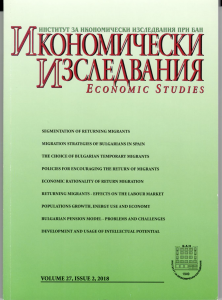Maria Bakalova, UNWE
Mihaela Misheva, UNWE
The article addresses one of the most intriguing questions in current migration researches: what drives return migration? It seeks at a micro level to find out what motivates the return in terms of the individual perceptions and reflexions of migrants returning to Bulgaria. The initial hypothesis is that non-economic factors have been the leading ones that have prompted the Bulgarian citizens to return to their homeland over the last decade. The underlying assumption is that the return to Bulgaria is not a failure of individual migration, but should be regarded in terms of the concept of emotional reflexivity and can be examined within the theoretical paradigm of transnationalism. The hypothesis is tested by qualitative and quantitative data from a 2017 national survey and 100 in-depth interviews with Bulgarian returnees. The text is organized in several parts. Following the introduction, in the second part methodological aspects of the two surveys are presented. Next part presents different theoretical paradigms of return migration and distinguishes between economic and non-economic factors of return, and between rationality and emotionality of the motivation. The concept of emotional reflexivity is introduced as an explanatory frame for non-economic emotional motivation for return. In the third part is the analysis of the qualitative sociological data on the returnees’ motivation, illustrated by quotations from the in-depth interviews. A comparison is made between qualitative and quantitative data on the motivation and reasons for return. The analysis confirms the initial hypothesis. We conclude that the „return“ of Bulgarian migrants to Bulgaria cannot be comprehended without taking into account the factors related to life cycle and the relationship with home and family, as well as motives related to migrants’ emotional reflexivity. The prevailing non-economic emotional and reflective motives for return to Bulgaria carry important implications and opportunities with regard to the development of effective policies and initiatives to encourage and support return.
JEL: A14, F22, J61
